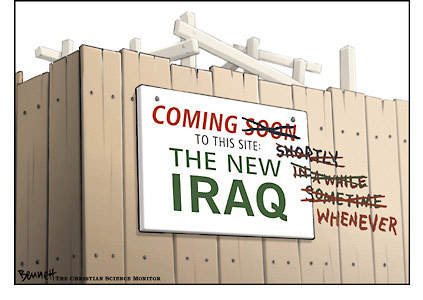|
restoring our biblical and constitutional foundations
|
Christianity on Trial
In times of crisis people have a tendency to look back to other similar times. They hope to find some guidance for the present there, both in terms of what to do and what to avoid. I well remember the year 1967, which everyone was touting as “the year of the light at the end of the tunnel.” LBJ kept telling us that the North Vietnamese were on the ropes, that the war was winding down, and that our boys would soon be coming home.
Then came the Tet Offensive. Although a military debacle for the Viet Cong, it showed us that North Vietnam still had plenty of fight left in it. We realized that our leaders had deceived us about the course of the war. We were told the war was almost over, but in fact it was just getting started.
Thirty-five years later, the nation is still looking
for leaders who will tell it the truth about how things are going and how
long our troops are going to be fighting. The war, indeed, is just getting
started. Pentagon officials are now hinting that U.S. troops might remain
in Iraq for as long as ten years. Reconstruction will take much longer.
President Bush himself is
 vowing
that the United States will never retreat from Iraq. “The enemy in Iraq
believes America will run. That’s why they’re willing to kill innocent
civilians, relief workers, coalition troops. America will never run,” Bush
vowed in a speech this week. These are just the latest in a series of
indications that the Bush administration is enmeshing the U.S. in a long,
bloody, military sinkhole evocative of Vietnam.
vowing
that the United States will never retreat from Iraq. “The enemy in Iraq
believes America will run. That’s why they’re willing to kill innocent
civilians, relief workers, coalition troops. America will never run,” Bush
vowed in a speech this week. These are just the latest in a series of
indications that the Bush administration is enmeshing the U.S. in a long,
bloody, military sinkhole evocative of Vietnam.
Why did so many conservatives back the Vietnam War? Because it was the “patriotic” thing to do. Because it put millions of Americans in uniform. Because it jacked up the economy. Above all, the war was fought because LBJ couldn’t give Vietnam to the Communists without a fight. American policy in Vietnam was never about democracy or self-determination for the Vietnamese. From the beginning, our policy was to contain China and to set up a “friendly” government in South Vietnam, i.e., one that would stand with the U.S. in its struggle against international communism and allow U.S. corporations to take advantage of Vietnam’s resources.
As then, so today. I cannot help but think back to my Anabaptist forebears, who were denied the right to civil and religious freedom because of their views on the function of the state, views that were a very grave threat to the established order. Humanity, they said, will never come to the truth by violence and killing. The Anabaptist espousal of religious toleration was thus directly related to their insistence on freedom for individual belief. It was the Anabaptist movement that first raised claims for the kind of religious liberty we take for granted today. Anabaptists could not in good conscience swear the oath of allegiance to the state because it committed them to the exercise of violence and confirmed a view of the function of the state that they could not hold. Little wonder they were always suspected of sedition.
Sadly, their voices seem muted today. Bush continues to needlessly alienate U.S. allies as he leads the nation deeper into the “big muddy” of international crises. The situation is only exacerbated by the president’s careless bravado of his “bring ’em on” attitude. And yet, there are those who, like our Anabaptist forbears, reject the absolutist claims of the state and seek to restrict its power and area of jurisdiction. They have quietly and patiently begun to teach us a new language for church and theology. They are reminding us that worse than the sin of weakness is the fact of the sin of intensive strength whose keyword is blindness—the blindness in which Christians consider themselves the chosen liberators of the world. Certainly at the heart of this question lies the whole complexus of church-state relations, loyalty to country, personal conscience versus submission to governmental decisions in which sinful human acts are made into national policies, and the moral dilemmas created by acts of individual conscience.
This conflict within the church is not a mere internal issue but one that affects the very existence of Christianity in America. The war has, in effect, put Christianity on trial. We may perhaps desire to keep ourselves neutral, declaring that we are not sufficiently informed to make up our minds. Or we may decide we do not want to become involved and dirty our hands by getting mixed up in “politics.” But, whatever we do and wish, we cannot have a peaceful world without submission and obedience to the One who, acting in hidden but overwhelming ways, toppled the power structures of society. Of Him it is said in Luke’s Gospel, “He puts down the mighty from their thrones and raises up the lowly” (Luke 1:52). And He pressures those who would be peacemakers to leave their fortresses of fear and proclaim the Word of God, which alone frees man from his bondage.
November 4, 2003
David Alan Black is the editor of www.daveblackonline.com. He is currently finishing his latest book, Why I Stopped Listening to Rush: Confessions of a Recovering Neocon.